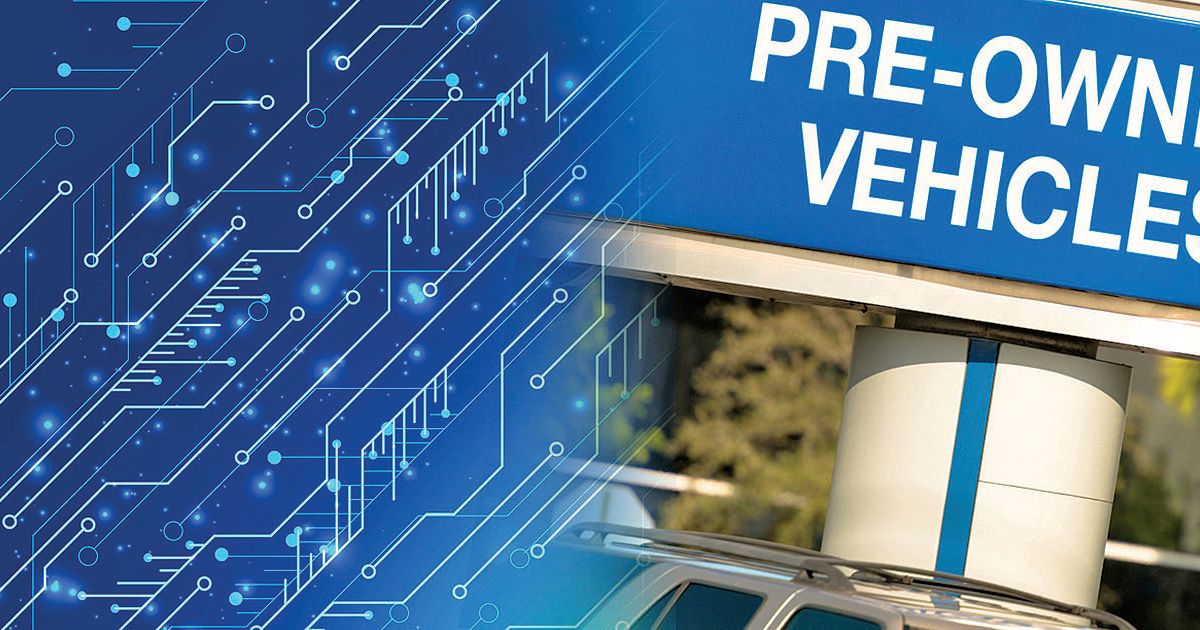
Finding quality used vehicles continues to be a challenge for auto dealers, from high pricing to low availability.
New tools aim to make it easier for retailers to keep their lots stocked.
Several retail technology companies are boosting their own capabilities to assist dealerships with used-vehicle sourcing, including by giving consumers an outlet to sell their vehicles.
Vehicle listings company CarGurus in January 2021 acquired a 51 percent stake in wholesale trading platform CarOffer, which allows dealers to create standing buy orders and automatically matches them to available inventory. CarGurus last year also introduced its Instant Max Cash Offer feature, through which consumers can sell their vehicles online.
Rival listings sites Cars.com and TrueCar have added tools of their own. Cars.com in March completed its acquisition of the assets of Accu-Trade, a provider of vehicle appraisal and valuation data and logistics technology. Company leaders say Accu-Trade is live in the market and enrolling more dealers, and will complement Cars.com’s online marketplace and dealership websites business by adding an instant guaranteed offer tool and VIN-based vehicle valuation and appraisal details.
The company said it hired Brian Kramer, formerly general manager of Germain Toyota of Naples in Florida, as executive vice president and general manager of Accu-Trade, effective Monday, June 13.
“We are advancing boldly into these new segments that are helping dealers digitize online financing, digitize the trade-in experience, be able to buy cars directly from the general public and bypass traditional auctions,” Cars.com CEO Alex Vetter told Automotive News at the NADA Show in March. “These are all things that we enable. And by doing it on a platform basis, we can allow dealers to do those things at a fraction of the cost of trying to do it themselves.”
Also in March, TrueCar introduced its Sell Your Car feature, which CEO Mike Darrow said in a shareholders letter in May offers consumers “an upfront, transactable value on their car available at any of our participating dealers.”
Technology is allowing dealers to find new sources of used cars at a time when constrained new-vehicle production has both reduced the volume of nearly new used vehicles flowing to the resale market and increased the competition for acquiring those used units. Wholesale prices remain elevated, making the vehicles purchased at auctions more expensive.
“The wholesale market transaction volume right now is actually lower than it has been for the last 20 or so years, and the reason is because inventory constraints have less cars flowing through the system,” CarGurus CEO Jason Trevisan said last month during the company’s investor day. “So as inventory comes back over the next year [or] two years, there will be a rising tide of transactions in wholesale.”
Since CarGurus bought its majority stake in CarOffer and launched its instant cash offer feature last year, the number of transactions on both tools generally has increased, according to CarGurus figures.
If a consumer visits a dealership to get a value for their car, they’ll get a single number from a single dealer, Trevisan told Automotive News in April.
“What’s so incredible about combining the instant trade matrix with our audience is the offer that you’re given as a consumer is the highest offer on your type of car across 1,000-plus dealers who have said, ‘Yeah, I would like to buy that type of car.’ And so we’re providing a service,” he said.
Grieco Automotive Group, of Delray Beach, Fla., began a pilot of CarOffer at one store this year after seeking an additional vehicle source. The group uses Manheim auctions, but prices and competition are rising, COO George Smith Jr. said.
Smith said the group, with 13 stores in Florida, California, Rhode Island and Massachusetts, likes that it can set specific model and price criteria in CarOffer and have the platform match its requests with available vehicles.
Used vehicles are an important part of Grieco’s business, as it now sells about two used vehicles for every one new vehicle, Smith said. He added that the group sells 850 new vehicles and 1,800 used vehicles, on average, each month.
“They find the vehicles for you, so it’s a little less time-consuming for my people,” he said.
Consumers now are armed with multiple offers for their vehicles, prompting many dealerships to put their highest and best offer forward early, said Micah Tindor, senior director of Kelley Blue Book Instant Cash Offer, part of Cox Automotive.
Through Kelley Blue Book’s instant offer tool, vehicle owners can enter their license plate or VIN, the current mileage and any damage, and then receive an offer that participating dealerships have agreed to honor, Tindor said.
“Right now, most dealers want a crack at any car they can get their hands on,” he said. “If they’re able to source 50 [to] 60 percent of their inventory, 80 percent of their inventory, very easily from auctions, I would expect that we would see dealers take fewer — let’s call them at-bats — using third-party tools. Now all that said, they’re not going to go away from it. Now that they’ve built these muscles and know they can acquire vehicles and see acquisitions at a lower cost, they’re not going to go away from it. But as inventory comes back online at auctions, we’ll see a natural balancing.”
Gary Schmidt, acquisition manager at Mike Maroone Honda in Colorado Springs, Colo., said his team tries to acquire vehicles from as many sources as possible, including Kelley Blue Book, TrueCar’s Sell Your Car tool, Facebook and Craigslist.
It’s possible to visit an auction with 500 cars running down the lane and not buy a single one because the prices are too high, Schmidt said. With digital tools, the dealership can go after an individual vehicle, with less competition and better odds of acquisition.
“This way, I have one piece of inventory in front of me, and if I feel I want to push a little bit more or anything of that nature, I can,” he said.